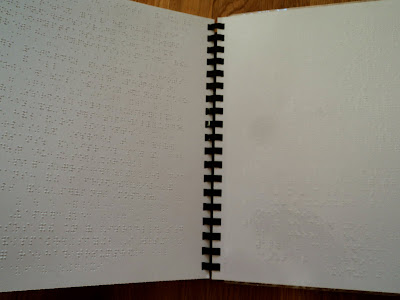Mediated Media
"Who said what through what channel to whom and with what effect?"
Tuesday, May 10, 2011
Experimenting with The 10 Commandments
Blind Commandments and Fire Commandments



 Braille on the left, laminated on the right
Braille on the left, laminated on the right
 What color will I become in my own fire?
What color will I become in my own fire?Say what Commandments
I had a few of my ESL students read the 10 Commandments and because they're from Korea and China they are not used to R and L sounds, V, B, F, Th, and S can also confuse words.
This was one of my favorite experiments because it encouraged actual communication about the 10 Commandments.
I recorded their readings analog and uploaded it to soundcloud
Silent and Binded Commandments
By binding the signer's fingers many of the crucial words in the 10 Commandments are untranslatable. This experiment proved how simple restrictions can create even deeper translation issues.
Sound-It-Out Commandments










To further explore the idea of confusing the 10 Commandments through a child's eye, I made the children's game, "Your 10 Commandments."



Monday, December 20, 2010
Get Your Documentary On This Holiday Season

Hold Me Tight, Let Me Go A film by Kim Longinotto
My Country, My Country A film by Laura Poitras
Grey Gardens A film by Albert and David Maysles
The Salesman by Albert and David Maysles
Touching the Void A film by Kevin Macdonald
Darwin's Nightmare A film by Hubert Sauper
Biggie and Tupac A film by Nick Broomfield
Tuesday, December 14, 2010
Here's a link to this site and the documentary is available on stream from NETFLIX
 The film details the experiences of "the greatest Internet pioneer you've never heard of,"[1] Josh Harris. The dot.com millionaire founded Pseudo.com, the first Internet television network during the infamous tech boom of the late '90s. After achieving prominence amongst the Silicon Valley set, Harris became interested in controversial human experiments which tested the effects of media and technology on the development of personal identity. Ondi Timoner documented the major business-related moments of Harris's life for more than a decade, setting the tone for her documentary of the virtual world and its supposed control of human lives.[1]
The film details the experiences of "the greatest Internet pioneer you've never heard of,"[1] Josh Harris. The dot.com millionaire founded Pseudo.com, the first Internet television network during the infamous tech boom of the late '90s. After achieving prominence amongst the Silicon Valley set, Harris became interested in controversial human experiments which tested the effects of media and technology on the development of personal identity. Ondi Timoner documented the major business-related moments of Harris's life for more than a decade, setting the tone for her documentary of the virtual world and its supposed control of human lives.[1] Among Harris' experiments touched on in the film is the art project "Quiet: We Live in Public," an Orwellian, Big Brother type concept developed in the late '90s which placed more than 100 artists in a human terrarium under New York City, with myriad webcams following and capturing every move the artists made.[2] The pièce de résistance was a Japanese-style capsule hotel outfitted with cameras in every pod, and screens that allowed each occupant to monitor the other pods[3] installed in the basement by artist Jeff Gompertz.[4]
The film's website describes how, "With Quiet, Harris proved how, in the not-so-distant future of life online, we will willingly trade our privacy for the connection and recognition we all deeply desire. Through his experiments, including another six-month stint living under 24-hour live surveillance online which led him to mental collapse, he demonstrated the price we will all pay for living in public."
"He climbs into the TV set and he becomes the rat in his own experiment at this point, and the results don't turn out very well for him[5]," says Timoner of the six month period Harris broadcast his life in his NYC loft live online. "He really takes the only relationship that he's ever had that was close and intimate and beaches it on 30 motion-controlled surveillance cameras and 66 invasive microphones. I mean his girlfriend who signed on to it thinking it would be fun and cool, and that they were living a fast and crazy Internet life, she ended up leaving him. She just couldn't be intimate in public. And I think that's an important lesson; the Internet, as wonderful as it is, is not an intimate medium. It's just not. If you want to keep something intimate and if you want to keep something sacred, you probably shouldn't post it."
(from Wiki)





